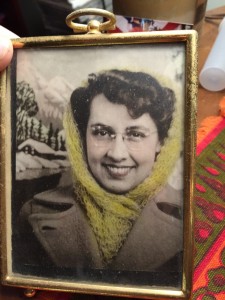Rev. Cathy Kaminski is the lead pastor at Trinity Community Church in Cincinnati, OH. It is her privilege to serve, love, and care for those who have paved many paths of righteousness through their lives of faith and service.
 The day before Thanksgiving, while many of us were busy lost in the hustle and bustle of pre-holiday traditions, our church suffered a loss. Early that morning Frances Alice (Fuller) Gilmore went to meet the Lord. While I’m sure many of you never had the pleasure of knowing Fran, or may never have heard her name, I guarantee that you have felt the influence of her faithful life.
The day before Thanksgiving, while many of us were busy lost in the hustle and bustle of pre-holiday traditions, our church suffered a loss. Early that morning Frances Alice (Fuller) Gilmore went to meet the Lord. While I’m sure many of you never had the pleasure of knowing Fran, or may never have heard her name, I guarantee that you have felt the influence of her faithful life.
How? Well, you see Fran was a woman who wore many hats in her ninety-two years. She was a daughter, sister, wife, mother, grandmother, librarian, chair of our church’s nursery school board, Christ-follower and naval officer. That’s right: Frances Alice Gilmore was a World War II veteran.
This shy girl from a small town in Maine answered the call of her country’s need. At age nineteen, she enlisted with W.A.V.E.S., (Women Accepted for Volunteer Emergency Service), and was soon stationed in San Francisco. W.A.V.E.S. was a program passed by Congress allowing women to fill shoreline assignments in order to release their male counterparts to active sea duty. If you’re anything like me, you might know little about these women who served our country, but I promise you that all of us, male and female alike, know their legacy.
Fran’s act of bravery would transform the course of her life and the lives of her loved ones. But I’m also convinced, that her willingness to step out into the unknown, to be a trailblazer down paths few women had ever walked before changed the course of history. It’s because of women like Fran that I am able to be a pastor today. Her faithfulness, her quiet confidence, her pioneering spirit opened doors. Her life broke down stereotypes, transformed minds, and set in motion opportunities for generations to come.
A few months back, Jo Ann Deasy wrote the blog post “In Honor of the First,” (See in Covenant Blogs here.) She wrote in honor of Sherron Hughes-Tremper, the first woman ordained to the Evangelical Covenant Church. Women like Sherron and Fran changed this world. I don’t often take the time to stop and gauge the depth of their gifts to humanity, but when I do I’m lost in adoration. A glass ceiling sadly still exists, for some more than others. But it is raised that much higher because of the influence of women like these. Women we may not know, but women whose lives continue to give us gifts long after their time on earth has come to an end.
In honor of Fran and the many other Frans out there, I write this post. A small piece of her story. A tribute to her legacy. My debt and gratitude go far beyond the words of this piece. I hope and pray to one day be remembered among pioneers like my friend Fran.



